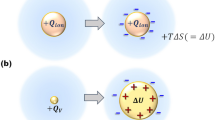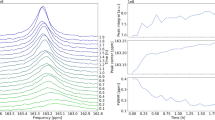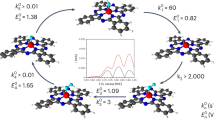Abstract
THE technique of capacity flow1, admirably adapted to the study of transient compounds, demands complete homogeneity of the contents of the reaction cell, in contradistinction to the technique of polarography, which depends on there being a concentration polarization. Exploratory experiments showed, however, that the two techniques could be combined, and adequate polarograms obtained, in solutions stirred by rapid streams of nitrogen; under these conditions the capacity flow technique could be used to hold the concentration of transient intermediates, such as the thiosulphatoferric ion (FeS2O3 +) constant, so that its reduction might be studied.
This is a preview of subscription content, access via your institution
Access options
Subscribe to this journal
Receive 51 print issues and online access
$199.00 per year
only $3.90 per issue
Buy this article
- Purchase on Springer Link
- Instant access to full article PDF
Prices may be subject to local taxes which are calculated during checkout
Similar content being viewed by others
References
Denbigh and Page, Disc. Farad. Soc., 17, 145 (1954).
Page, Trans. Farad. Soc., 50, 120 (1954).
Kolthoff and Miller, J. Amer. Chem. Soc., 63, 1401 (1941).
Author information
Authors and Affiliations
Rights and permissions
About this article
Cite this article
PAGE, F. Reduction of the FeS2O3 + Ion at the Dropping Mercury Electrode. Nature 184, 1481–1482 (1959). https://doi.org/10.1038/1841481b0
Issue Date:
DOI: https://doi.org/10.1038/1841481b0
Comments
By submitting a comment you agree to abide by our Terms and Community Guidelines. If you find something abusive or that does not comply with our terms or guidelines please flag it as inappropriate.



